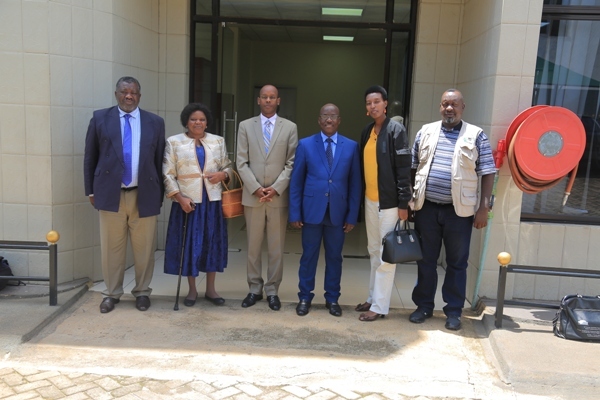
Kigali: Today, members of the Namibian Parliament visited the National Commission for the Fight against Genocide (CNLG) to attend a training session. The purpose of this session was to detail the work done by CNLG in the ongoing effort to combat genocide ideology and denial. The session was titled “The Genocide Against the Tutsi and Transformation in Rwanda” and was led by Dr. Jean-Damascène Gasanabo, Director General of research at CNLG.
The members of Namibian Parliament are visiting Rwanda for a five-day period to gain a better understanding of Rwanda’s history. They specifically aim to ascertain the facts of the Genocide against the Tutsi as well as to examine the rebuilding of Rwandan society post-genocide.
After introductions, CNLG’s mission and responsibilities were outlined, followed by an overview of the events that led to the Genocide against the Tutsi in 1994. This covered the history of Rwanda, particularly the origin of ethnic division in Rwanda. This was followed by an account of the initial planning phase and ultimately the execution of the genocide.
The presentation also looked at commemoration and preservation of the genocide and the work CNLG does during the Kwibuka commemorative period. There were discussions on dealings of the remembrance as well as the increased sense of the awareness around the genocide in recent years and the increasing number of the attendees at commemoration events.
Also discussed was genocide ideology and how this ideology still exists and proliferates among Rwandans, especially during the commemoration period. Additionally, cases of genocide denial in academic writings and the media within the international arena were also mentioned and the threat they pose in the fight against genocide denial.
The presentation also focused on the procedures of the Gacaca Courts and the operations that took place to create a system of operational justice. CNLG does a great deal of work in the capacity of research and documentation on the Gacaca trials. Dr. Gasanabo detailed the key efforts taken by CNLG to preserve, digitalize, and index documents from the Gacaca trials to create a well-coordinated archive.
Following this, laws incriminating acts of genocide were also touched upon. This focuses on occurrences of genocide ideology and genocide denial through hate speech, destruction of evidence or a manifestation of harmful behavior towards survivors of the genocide. There are also a number of indictments that have been issued concerning bringing genocide fugitives to justice.
The presentation concluded with an open dialogue along the lines of where ethnic divisions first originated from, the motivations for killing and how the pre-genocide government led the execution of genocide. There were also questions on what happened to people of other nationalities during the genocide period.
There was a brief reference to the Genocide against the Herero and Namaqua and the best ways to go about documentation and creating awareness and prosecution of killers. This is significant to the creation of awareness on the atrocities that took place in Namibia and the consequences of it in their society today. We value the time taken by our Namibian guests to inform themselves on the Genocide against the Tutsi in Rwanda and are privileged to serve as a model for which they create their own system of justice.
CNLG would like to thank the members of the Namibian Parliament for visiting CNLG this morning and we look forward to a continued collaboration with them in the ongoing fight against genocide. (End)
